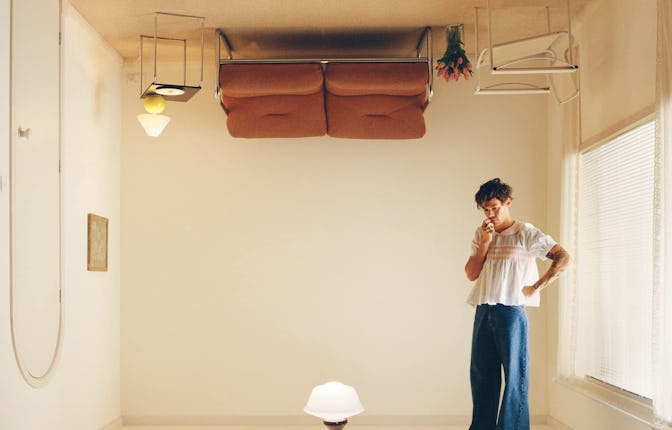On Harry’s House, Styles struggles to outrun his influences
The singer’s third album is at its most compelling when the stakes are lowest.

It becomes a sort of existential question: Do you believe Harry Styles does cocaine? On one hand, the British singer is young, lavishly rich, and presumably idle; it might be more notable if he didn’t. But the drug, referenced a couple of times across his third album, Harry’s House, is made to feel like so many of the other details in Styles’ writing: borrowed, overdetermined, straining to signify a past he’s too young to remember and a present-day vapidity he’s too timid to fully skewer or fully embrace. You’re left to picture him in his dad’s white linen suit—lived in and stylish, but jutting out past the ends of his fingers all the same.
When Styles was in One Direction, the stratospherically popular group spawned from a British reality show, he and his four collaborators were forced to record at a pace familiar for acts of their kind. Every year for a half-decade, they released a new album between the 9th and 25th of November, just in time for the holiday rush, a preening but decidedly non threatening metronome. In the years since 1D’s breakup, all its members have courted a music press that has been eager, ever since Justin Timberlake took the Neptunes beats Michael Jackson thought were too soft, to launder the reputations of ex-boy banders, recasting them with more edge, more ambition, more sexuality than they were allowed to betray during their initial incarnation. None have done so as successfully as Styles. The singer is smartly circumspect about his private life, growing a little elusive in an era when even the biggest stars can seem overexposed. So though he has now released three solo LPs in five years, there’s a sense that he exists outside of the celebrity apparatus, acting off impulse alone.
This is helpful to Styles, because the music itself leaves little to chance or instinct. His work to this point — a self-titled debut from 2017 and Fine Line, from two years later — has rarely risen above the level of pastiche, grasping for Bowie, for Prince, for the Stones and the Beatles and on and on. The smallest flourishes feel lifted from more memorable songs, the tiniest tics practiced and re-laid until they sit just so. His wardrobe, which includes many pieces made and marketed for women, has been received as — and likely is! — a sincere rejection of gender norms rather than a cynical provocation; Styles speaks in interviews and sings on records with the sanded-down therapyspeak of today’s self-consciously sensitive man. And yet, Polaroids of him on stage or on red carpets are nearly indistinguishable from those of glamorous male rock stars 40, even 50 years ago.
Harry’s House comes closer than its two predecessors to scanning as synthesis. Its lead single, “As It Was,” is the smartest use of Styles’ voice to date, its airiness a perfect midpoint between the relentlessly carefree track and the foreboding lyrics, allowing Styles to flit back and forth between the two without telegraphing that tension. At many other points on the album, it’s too thin to cut through even the litest of the lite-funk it dabbles in. When he tries to slink through the horn-driven opener, “Music For a Sushi Restaurant,” it sounds, instead, like he’s being buried. Something similar happens on “Daydreaming,” where not even the falsetto background vocals, brought way up in the mix, can help the singer find a foothold in a track that careens away from him by the end of its first verse.
Styles is at his most compelling when the stakes are lowest. The cheery “Daylight,” with its strolling bounce and cleverly stacked vocals, is nearly irresistible, especially in its sparer verses; “Cinema” is so contrived that it comes out the other side as endearing. In truth, it is almost impossible to be offended by any decision Styles makes on Harry’s House, because no song seems to hinge on any one lyric, or musical choice — while he is not an ironic artist, or a sarcastic one, it seldom seems as if Styles has anything on the line. For as open as he professes to be (“I can see you're lonely down there/Don't you know that I am right here?” he croons on “Satellite”), these ultimately play like genre exercises.
Conscious as he is of his influences, his reputation, his presentation to the public, Styles is not always a sharp enough writer to outrun the worst impulses of the boy band machine he comes from. While he has in the past made moving defenses of the female, teenaged fans who have been historically disrespected by supposedly “serious” male artists, it’s difficult to find anything in “Boyfriends” but pat condescension. “Boyfriends, they think you’re so easy,” he sings over treacly acoustic strumming, “They take you for granted.” There is, of course — of course — no intended malice, but there is also no subtext or self-awareness. Like many of Styles’ songs, it reveals him as well-intentioned and broadly competent, yet too formally limited to transcend what he’s ripping off or trapped within. Sometimes, it seems, you end up right where you started.